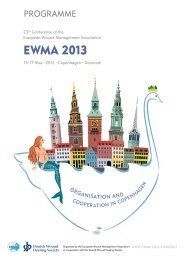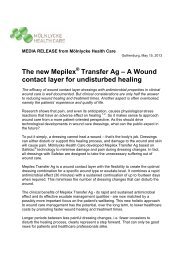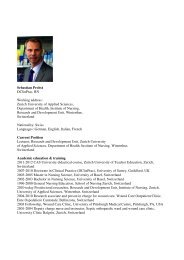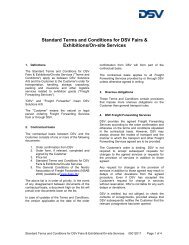You also want an ePaper? Increase the reach of your titles
YUMPU automatically turns print PDFs into web optimized ePapers that Google loves.
ORAL PRESENTATIONS<br />
101<br />
<strong>EWMA</strong> Honorary Lecture<br />
HONORARY LECTURER OF THE <strong>EWMA</strong> CONFERENCE <strong>2013</strong> COPENHAGEN:<br />
FINN GOTTRUP<br />
Prof. Gottrup is the author of more than 400 publications, and has lectured extensively<br />
on clinical and experimental wound healing, wound infections, tissue perfusion, and<br />
oxygenation, within <strong>EWMA</strong> and to provide education in wound healing and treatment. He<br />
is recognised by a wide range of professions as Denmark’s leading expert on wounds.<br />
Prof. Gottrup is member of several national and international boards, committees, and<br />
editorial boards, an energetic lecturer of medical educations, and a regular speaker at<br />
international conferences, where he is appreciated for his high-quality presentations and<br />
broad knowledge of wound healing. In 1991, Prof. Gottrup was awarded the world’s first<br />
professorship in wound healing and he became professor of Surgery at University of<br />
Southern Denmark in 2003.<br />
Finn Gottrup has earned this distinction due to his committed life work within wound<br />
healing. This includes his greatly appreciated involvement in the <strong>EWMA</strong> Council as<br />
president, past president, recorder, and Council member and his capacity as founder<br />
and long-serving president for this year’s local organiser, the Danish Wound Healing<br />
Society, one of oldest national wound management organisations in the world.<br />
Finn Gottrup started the Copenhagen Wound Healing Center in 1996, and in 2003, was<br />
involved in establishing the University Center for Wound Healing in Odense, Denmark.<br />
These wound healing centres have been a prime force behind Denmark’s status among<br />
the world leaders in wound management. Prof. Gottrup was head of the centres from<br />
1996-2003 and 2003-2007, respectively. Presently, he is professor of surgery and<br />
consultant at Copenhagen Wound Healing Center.<br />
KEY SESSION: NUTRITION IN WOUND CARE<br />
102<br />
Key Session: Nutrition in Wound Care<br />
Nutritional status: assessment and risk stratification<br />
Alessandro Laviano 1<br />
1 Department of Clnical Medicine, Sapienza Unversity (Rome, Italy).<br />
Malnutrition is a risk factor for the development of pressure sores and negatively impacts<br />
on wound healing. Therefore, it is clinically relevant assessing nutritional status of<br />
patients and individuals living in the community, in order to precisely evaluate the risk of<br />
developing complications, including wound dehiscence and pressure sores.<br />
Unfortunately, the importance of nutritional assessment is rarely considered in hospitals,<br />
nursing homes and in the community. In patients and individuals living in the community,<br />
nutritional status can be assessed and/or screened. Nutritional assessment is a complex<br />
procedure which requires specific expertise in evaluating the status of body<br />
compartments. On the other hand, nutritional screening is a simpler procedure, which is<br />
based on few information which can be easily obtained in all patients and individuals.<br />
Therefore, nutritional risk screening is a procedure which can be completed by personnel<br />
without specific expertise in clinical nutrition. It is now widely demonstrated that<br />
nutritional risk screening is effective in improving nutritional care and clinical outcome of<br />
patients, when implemented. Unfortunately, nutritional risk screening is not a procedure<br />
frequently included in the admission protocols to hospital and nursing homes. To<br />
contribute to the prevention of the development of impaired wound healing and/or<br />
pressure sores, nutritional risk screening should be implemented in every clinical setting<br />
worldwide.<br />
70






